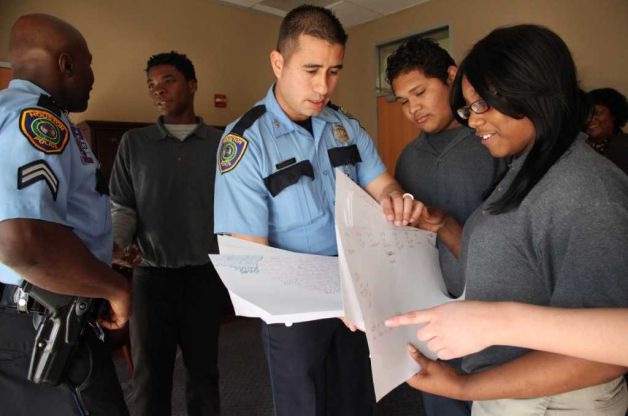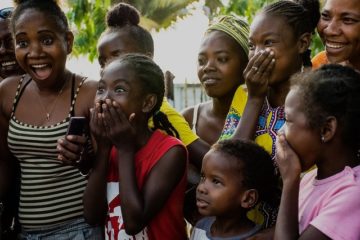Cops, Black Kids, & The Way of Jesus

A couple of years ago my wife Carrie was driving through our neighborhood with several black teenagers in her minivan – mostly boys I believe. They were all friends of ours and part of our church.
As they drove past a patrol car, the officer inside looked at them, pulled out and began following them. The kids noticed and became very nervous. When the officer turned his lights on for Carrie to pull over, several of the kids were barely controlling a rising panic. Two of them were shaking.
The officer walked up to the van, looked inside and at everyone inside very carefully. He asked Carrie a number of questions about where they were going and what they were doing while watching her intently. After all his concerns and questions were satisfied, he told them to have a great day and let them go.
The officer clearly pulled them over because he saw a white lady driving a minivan full of black teenagers, but why did he do it? What was it about what he saw, what was it about their profile that made him decide he needed to pull them over?
Why did the kids immediately start to get nervous when they saw a patrol car behind them? What was it about the man’s profile that made them start to shake and nearly break into panic when the lights came on and he started approaching the vehicle?
Same answer to both questions – EXPERIENCE.
For any police office in our area their personal experience, the reports they read, and the stories they hear inform their perspective that crimes, particularly violent crimes, are overwhelmingly committed by black males, particularly young black males.
Even more specific to this particular situation was the fact that there had recently been a number of white women kidnapped in the area by groups of young black men – typically to have the woman drive them to an ATM and withdraw money.
So when the officer saw my wife’s van drive by with a white female driver and several young black people, his experience (which shaped a profile) told him that something bad could be going on and he should look into the situation further.
For these kids who had grown up in the projects, their whole lives had been filled with stories and experiences that informed their perspective (and shaped a profile) that police officers were scary, powerful, bad guys. They had seen their fathers, their uncles, their cousins, their friends, and sometimes even their moms, and aunts being taken away by the police, not to be seen again for years sometimes, or even ever. They had almost all seen people fight with cops and lose badly and most of them know or know of someone who lost their lives in an altercation with a police officer. Imagine seeing and hearing these things through the eyes of a kid. Scary.
Add to this that most of these kids have grown up on stories of corrupt cops – a police officer who misuses his or her power because he is a bully or “produces” evidence in order to make an arrest of someone who he “knows” is guilty even though there isn’t any evidence to be found at the moment. Every industry and organization will have their bad apples, and a police department in a major city is no exception.
They also all knew plenty of people who were in prison that didn’t do anything wrong but were just in the wrong place, at the wrong time, around the wrong people. This message and reality is heard and interpreted differently when you are growing up in the wrong place and all your friends are the wrong people and it feels like the wrong time could drop on you at any minute.
So even though the police officer that pulled my wife over didn’t do anything to directly cause terror and panic in the passenger seats of the van, the profile that their experiences had shaped and informed, the profile that the police officer matched, was all that was needed to stir up those feelings.
So what do we do about all of this? The majority of young black people are not violent criminals – even the majority of urban, poor, young black males are not – but a profile exists, shaped by negative experiences provided by a minority of bad actors.
The vast majority of police officers are not corrupt or bullies. They are often people who say yes to a relatively low to modest paying job, the responsibility of managing the worst that humanity has to offer, trauma and depression inducing experiences, and tons of scrutiny because they want to serve their communities… but a profile exists shaped by negative experiences provided by a minority of bad actors.
How can we begin to heal the relationship and perceptions between cops and between young black people?
I think a very practical solution can be found in the teachings of Jesus:
“You have heard that it was said, ‘Love your neighbor and hate your enemy.’ But I tell you, love your enemies and pray for those who persecute you, that you may be children of your Father in heaven.” – Matthew 5:43
“Enemy” may sound like a strong word, but for discussion’s sake, let’s say that any group your experiences have developed a profile of “threat” or “potential threat” to you or your community qualifies as an “enemy.”
If once people on either side of this issue realized that they had a profile of an “enemy” they made it a priority to spend time getting to know someone that fits that profile and loving them (you can’t follow this teaching of Jesus to love your enemies in a removed, theoretical way – you have to make contact and get to know them). Their new experiences would begin to add new dimensions, depth, and color to their profile. They would begin to see “the other” not just as “potential enemy,” but also as “potential friend.”
This practical application of Jesus’ teaching would begin by changing what the police officer sees when he sees a vehicle with a white woman driver and several young black males drive by. Instead of just thinking, “That could be another woman being kidnapped,” he could also think, “…or that could be my friend’s son Trey riding around with his pastor and his friends.”
Applying Jesus’ teachings would begin to shape the profile that the kids in the cars see when they see a police officer approaching as well. Instead of just thinking, “Oh no, that could be a cop just like the one that took my dad away,” they could also think, “…or that could be a friend of Officer Daniels who helps me with my math homework on Tuesdays.”
If allowed to grow from there, the way of Jesus would begin to transform the community. The commitment to the way of Jesus, that led people to seek out a representative of the “enemy” profile to love, would begin to blur the lines of otherness. Those following the way of Jesus would have new stories to speak into their groups, reshaping the profiles of those around them.
As their love and respect for a person of the “other” grows, they would see in a new way that it had not been the “other” that had made them enemies when they could have been friends all along. It was bad actors on both sides – the young black people committing crimes and the cops abusing their power – that had made them enemies and if they wanted life to be better for their new friend, their friends group, and their own group, then dealing with those bad actors has to be a real priority.
Young black males wouldn’t tolerate crimes by young black males for their own sake and for what it does to their other relationships in the world. Police wouldn’t tolerate abuse and corruption by other police for their own sake and for what it does to their other relationships in the world.
The lines between “us” and “them” would begin to blur.
Common ground would be found not around trying to make the “other” go away but by working for the good of the “other.” Pay increases for police officers would be demanded by the community so that a better quality of officer could be hired and retained. Root causes of crime would be actively engaged. At-risk teens would have mentors and struggling students would have tutors. The criminal justice system would be reformed from a punitive model to a habilitation model (you can’t re-habilitate someone who has never been habilitated to start with) giving people the social skills, negotiation skills, education and job skills they need to become productive and full-fledged members of the community.
This may seem like a fantasy but it’s not. It has happened before and it is happening now. Small groups of people following the way of Jesus have already had this kind of an impact on communities in countless ways around the world. It doesn’t work overnight, but it works.



No Comment